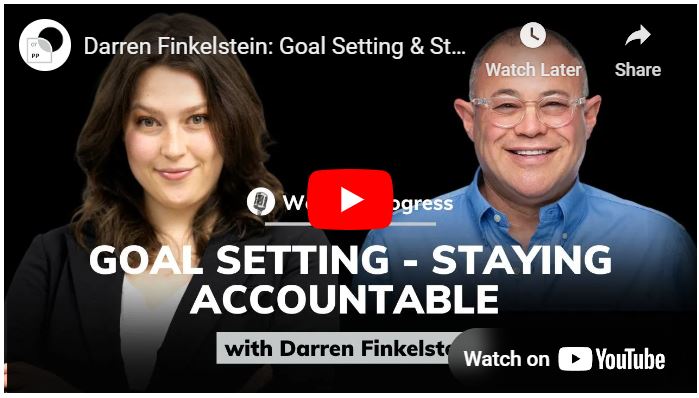Every business sector works differently. A logistics company’s daily operations differ significantly from those of a creative agency. Even leadership expectations and team dynamics can shift depending on the industry. Therefore, it becomes evident that a uniform coaching approach is ineffective. Specific sectors shape the direction of personal growth, accountability, and team performance.
Discover your Accountability Score and increase the probability of smashing your GOALS and Getting Sh!t Done!
Whether it’s rigid timelines in construction or rapid pivots in tech, coaching should reflect these challenges instead of ignoring them. Addressing leadership gaps with industry in mind results in solutions that last longer. They feel familiar and usable and actually change how people behave and make decisions. More than anything, this approach respects how people work and helps get the most out of them without overcomplicating things.
Understanding Industry Needs
Every industry operates independently and presents distinct challenges. That’s why coaching needs to adapt, not the other way around. If coaching appears disconnected, teams may easily lose focus and miss the intended message. But when the content speaks to what they face every day, change starts to feel possible. People can visualise what it looks like on the floor, in the field, or during a sales call.
Take manufacturing and tech start-ups as examples. The differences here are stark.
In the manufacturing sector, structure and routine are paramount. Safety matters, production cycles repeat on tight timelines, and clear hierarchies guide most decisions. Coaching in this area should focus on:
– Building accountability through task clarity and responsibility lines
– Supporting frontline managers with practical decision-making frameworks
– Improving communication consistency across shifts
On the flip side, tech start-ups often operate in constant change. They test ideas often and rapidly, roles shift quickly, and small teams often make big decisions. Coaching in this space needs to zoom in on:
– Creating flexible systems that still hold teams accountable
– Helping with role clarity during rapid growth
– Supporting time and energy management for founders adapting to fast shifts
Recognising these differences means a coach can stay relevant. Tailored questions and recommendations help teams feel understood, not overwhelmed. The goal is not to import solutions from another industry but to shape support that already fits the pace and pressure of the business.
Creating Sector-Specific Coaching Strategies
Once the coaching is built around the way the industry operates, everything else starts to align. But this process goes beyond swapping examples or changing terminology. It’s about understanding how people actually think and work in that space and offering them tools that make sense in their workflow.
To build coaching strategies that add value:
1. Start by observing the work environment. Are leaders hands-on or removed? Are decisions made based on urgency, systems, or group discussion?
2. Align the accountability model with workplace rhythm. In retail, quick wins might spread momentum. Outcomes in legal or consulting may take longer, but they must be strategically consistent.
3. Spot the usual blockages. Is time always short? Are people drowning in unclear roles or overcommitted schedules?
4. Use tools that connect to their workflow. It could be weekly check-ins, role clarity documents, reflection prompts, or monthly reports—whatever fits.
Consider a commercial construction business. Managers might be strong with deadlines and budget controls but unsure about delivering feedback effectively. Instead of forcing them into unnatural daily sessions, coaching here could adjust to the project’s phases. It could involve short check-ins at critical milestones and a space for monthly leadership reflection. That way, it doesn’t add more—it helps make better use of the time they already commit.
When a coaching model fits the way the sector works, habits shift naturally. Accountability becomes part of everyday work, not an added chore.
Benefits Of Customised Coaching Programs
Tailored coaching isn’t extra polish. It’s what makes things click from the start. When coaching works with the grain of how people already operate, outcomes show up sooner, and the changes last longer.
A well-structured custom coaching program often results in:
– Clearer roles and expectations, boosting personal accountability
– Better trust across teams, as advice reflects real-world experience
– Less fluff, with more usable actions that improve clarity
– Time saved from fixing one-size-fits-all solutions that fall flat
– Leaders who act with more confidence and less second-guessing
It’s not about giving everyone something brand new. It’s about helping them focus on what matters by making room for what works. Teams already have talent and systems. Coaching just sharpens the use of both.
Real-Life Applications Of Tailored Coaching Across Industries
The most useful coaching programs are built around actual problems and everyday patterns. When teams see coaching slots naturally fit into their process, they buy in. Things shift faster. Conversations become practical, not theoretical.
Take a professional services firm as an example. Partners noticed that junior staff avoided complex tasks, leaving piles of work for more experienced consultants. Off-the-shelf leadership programs missed the point. What worked? The coaching emphasised enhancing confidence in client environments and providing assistance for decision-making, both deeply rooted in the firm’s typical operations. The result? The outcome was the development of more proactive juniors and a reduction in turnaround times.
Tailored coaching also works across other industries. Here are a few more examples:
– Retail: Supporting supervisors to stick to rosters while learning to delegate instead of micromanaging
– Healthcare: Replacing constant crisis-response with steady leadership check-ins and structured accountability
– Education: Guiding heads of departments to spend more time on team engagement rather than only on admin tasks
– Natural resources: Bridging communication between field engineers and the head office through practical updates and process reviews
– Creative services: Aligning project targets between client-facing and production teams to reduce backtracking
Each case highlights something different. Coaching didn’t try to change the nature of the work. It helped people get better at doing what’s already expected.
Building Skills for Lasting Impact
Every sector has its own pace, routine, and team expectations. Coaching clicks when it respects that. A fixed model, no matter how polished, can stand in the way. The most useful coaching strategy is one that fits in, adds value, and removes friction.
When leading a team, consider this: Is our support system facilitating adaptability and growth, or are we becoming bogged down in tasks? Coaching that speaks your team’s language helps you move from managing stress to making progress. It makes accountability easier to apply and leadership skills easier to grow.
For those looking to sharpen their leadership skills and improve team dynamics across different sectors, exploring tailored entrepreneurship coaching programs can be a great step forward. At Tick Those Boxes, we design coaching that aligns with the real challenges of your industry, helping you work smarter and drive better outcomes.
Let us help you transform how your team operates and make leadership feel less like a burden and more like a skill you can rely on. We specialise in helping individuals and organisations become more accountable. Contact our team to see how our programs may help you establish a more effective and accountable workplace.


